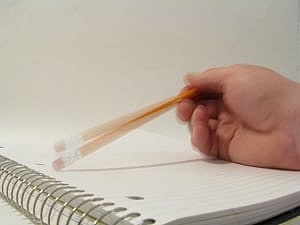How to Improve Your Essay Writing Quickly: A Step-by-Step Guide
About the Author
Stephanie Allen read Classics and English at St Hugh’s College, Oxford, and is currently researching a PhD in Early Modern Academic Drama at the University of Fribourg.

Whatever your brand of brilliance – whether you’re a physics genius, a sporting hero or (like me) a blinky, bookish type – there comes a point in most students’ academic careers when being good at life means being good at essays.
You should also read…
As the subjects you study get more advanced and complex, you’re increasingly asked to think, evaluate, and have opinions where you once might have simply made calculations or learned definitions. In general, the further you progress through your education, the more rote learning will be replaced by the kind of analysis usually best demonstrated by essays. If by some miraculous feat you manage to avoid writing anything substantial at high school, it’s something you’ll almost certainly have to face at university – yes, even if you’re studying a science subject (although the essays won’t usually be quite as long). One way or another, essay writing comes to us all.

The likelihood is that at some point in the not-too-distant future (unless you are both incredibly reluctant and startlingly resourceful) you will have to write an essay, either in exam conditions or in your own time, that will count towards a final grade in some way. If this is a scary prospect for you, there’s good news and bad news. The bad thing about essay writing is that it’s not something – like French verbs, or the ability to run long distances – that miraculously gets better on its own if you just keep having a go. To improve at essay writing, students often need a paradigm shift: to figure out exactly what isn’t working, and why, and to learn and apply a new way of doing things.
The good news, on the other hand, is that the individual skills required to write a strong essay are things you can learn, practise and improve in. This article is all about pinpointing what those skills might be, and giving you some suggestions as to how you might develop them. Not all these tips will work for all of you, but being good at essay writing, like being good at any other school-related discipline, is all about trying different things, and devising your own way of doing things.
Getting organised

Before you even start planning an essay, I’d recommend you sit down and have a quick think about how you want to do it. First, what resources will you need? The internet, or library books? This might affect where and how you decide to work: I have wasted a huge amount of time trying to find versions of articles on the internet that I knew were in books at the library, or procrastinating because I wanted to work at home rather than leaving the house. I would recommend taking yourself to a library ninety-nine times out of a hundred.
Secondly, if you’re working from books or downloadable articles, can you afford to work somewhere without the internet? The absence of Facebook and Instagram will guarantee your concentration will be about a hundred times better, which will show in the quality of your work.
Next, make a little timeline for your essay. Make a list of everything you want to read and try to get hold of all your material before you start. Think about how long you’re going to spend reading and researching, planning, and writing – leaving a day or two before the deadline to make any significant changes, or just in case things don’t go to plan. I’d recommend allotting 3 hours to read a 20-page article, and about a day to write 2000 words. This might sound like a silly amount of planning, but the point of it is this: hundreds of all-nighters have taught me that essay-writing becomes incredibly stressful and painful when you’re up against the clock, and a reader can tell immediately if something is rushed or dashed off at 2am on the day of the deadline. What’s more, you simply won’t have your best creative ideas under pressure.
If you’ve got time, have a look at this – comically eighties and slightly cringey – video about creativity. A lot of what the speaker says about thinking and playfulness is, in my opinion, directly applicable to essay-writing.
Gathering information

Some teachers set reading lists for essays, or make suggestions about where students should look for information; others ask you to find sources yourself. Even if your teacher does prescribe reading, it’s always worth seeing whether you can find something extra that will add breadth, depth or a fresh perspective to your argument. However, it’s important to think carefully about whether a source is reliable and valuable.
What sort of sources should I use?
The most appropriate sources will vary from subject to subject. Here are some common ones:
– Academic articles: These are essays by scholars at universities, and usually published in journals or as books. They are always useful, and can be found by looking in the library (ask your teacher for recommendations!), having a poke around Google Scholar, or, if your school has a subscription, on the website JSTOR.org. Search for key words and phrases and see what comes up.
– Newspaper articles: might be useful evidence for an essay in History, but may not be detailed or scholarly enough for Biology. If you use a newspaper article or opinion piece, think about the factors that might bias it and include your thinking in your essay!
– Wikipedia: a very useful starting-point, and an increasingly reliable resource. However, avoid referencing it: a teacher or examiner might not like it and may take against your essay. Instead, look at the reference section at the bottom of the article and see where the writer has gathered their information from.
– Online blogs: in general, stay away from these, as you don’t know who’s written them and how valuable their opinion is, or how reliable their facts. The exceptions are blogs by well-known experts.
How should I take notes?

It might feel like the world’s greatest faff, but taking good notes from your sources will save you a huge amount of time when you come to plan and write your essay:
– Type out notes as you read, rather than simply underlining or highlighting – thus you’ll have a summary of the most important chunks of essays ready to use when you plan, rather than having to trawl through whole documents again looking for quotations.
– For this reason, if you think you might want to quote something, copy it out in the exact wording of the writer.
– Type notes in a different colour for each new source you read. In order to engage intelligently with what you’ve read, you’ve got to remember who said what, what they meant by it, who they were fighting against and whether you agreed with them or not. Colours are a really helpful visual aid to doing this.
– At the end of each new essay or article, write a few lines summarising the author’s main points, and whether or not you agree with them.
N.B. Your critical engagement with the scholars and authors whose work you’ve read will count for a huge chunk of marks. This does not mean listing a load of names and rehearsing their arguments; nor does it mean disagreeing with everyone for the sake of it. Instead, think about whether or not what they’re arguing holds true in your experience – or compare them to each other.
Planning

Planning is the single most important step in writing a good essay, and, frustratingly, also the step that’s most often rushed or neglected by students. If your essays often get criticised for having poor structure or unclear lines of argument, chances are you need to practise your planning. I use the following step-by-step process to turn my notes into a good plan; you can try it too, and see if it works for you.
1) Re-read your notes a couple of times, and underline anything you think is particularly important, interesting, or relevant to the area of the topic you want to discuss. As far as possible, try and organise your thoughts into sections, and see if you can link ideas together.
Tip: It might be that you’ve got two or three different ideas for a topic, and you’re not sure which to go with: in this case, you can use a couple of different spider diagrams to see which works best. Where do the ideas link together most easily, or fall together into neat sections? Which question would you be able to answer most fully?
2) Sit back and look at your diagram(s), perhaps alongside your notes, and work out the main ‘point’ or conclusion you want to make in your essay. The best essays are characterised by a clear line of argument throughout – I don’t really buy the idea that essays should present both sides of a question. I always decide what I’m trying to say; the point I want to conclude with, before I start. Now, the job you’ve got in writing the essay is to set this conclusion up.
3) Work backwards, using the links you’ve made on your spider diagram: what do you need to argue or show to make your point? Jot these ‘points’ down in a couple of words each. This forms the beginnings of a skeleton for your essay.
4) Start to fill out your skeleton with information from your notes, and any extra ideas you might have. If you’re writing a literature essay, it’s CRUCIAL that you include some close analysis of passages to support your argument. Jot down the sentences that link these in to the greater structure.
5) Fill out your skeleton more and more, until it’s essentially a rough draft in bullet points. Every twist or nuance of your argument should be in there; every introductory and concluding sentence for every paragraph, making it explicit how this paragraph answers your question.

6) At this point, it’s very helpful if you can get someone (a friend or a parent will do) to read over your plan and see if it makes sense. Does everything follow? Is it all relevant? Your plan should be so complete that the person who reads it will immediately be able to spot any flaws. Move things around, add or delete to incorporate their criticism: it’s much easier to change something in bullet-point format than when it’s all written out properly.
Don’t expect this process to be quick or easy. For a 1500-word essay, I usually write a plan of about three sides, and spend at least three hours making sure that before I put pen to paper, every kink in my argument is ironed out. The pay-off of doing it this way is that the writing process is short and easy – a case of joining up the dots, polishing bullet-points into sentences – much better than coming up with ideas and organising thoughts at the same time as finding the words to express them.
Get better and better: If you struggle with structure or clarity, practise your planning! Give yourself a limited amount of time (say, two hours), pick three previous essay questions from an exam or coursework paper, and plan your answers as thoroughly as possible. Get your teacher to look over your plans when you’re done.
Writing
The ‘actual writing’-bit can be the most daunting and stressful part of the essay process, and is where most students get stuck. Here are some tried-and-tested solutions to common writing problems:
I can’t get started

It’s quite common to want your first sentence to be arresting, paradigm-shifting, to propel your reader headlong into your essay. However, this desire can be paralysing: one of the most stressful feelings in the world is that of staring at a blank page, thinking about the number of words you’ll need to fill it all up. The key to getting started is to just write something. Don’t worry about how good it is – get it down, and move on, and come back and change it when you’re well into your flow.
Writers’ block
Go back to your plan and make sure you know what you’re arguing. If you still can’t get the words out, try and write down what you want to say as simply as possible. Then move on to an easier section of the essay. Alternatively, you can try going for a walk, making a cup of tea or having a break.
It all feels a bit wrong…
Sometimes, in the process of writing, you’ll realise that you entirely disagree with two-days-ago you, and you don’t really believe in the argument you’re trying to make. If it is the case, go back to the drawing board. Don’t plough on regardless – a lack of conviction will show in your essay. Return to your plan, and see if you can use similar material but change the emphasis, and perhaps the odd bit of evidence, to produce a different argument.
Style
Everyone has their own individual writing style: your might be as purple and flowery, or scientific and direct as you like (within reason). However you write, to get top marks, it’s crucial that you learn to be precise.
Style-wise, there are two poles of wrongness: vagueness, and over-complication. Of course, every subject has its particular vocabulary, and learning this will be crucial, and sharpen your analysis; but remember that little words are your friends too! Make sure that you know the exact meaning of each word you use. Crucially, make sure you know exactly what each word you’re using means, and think carefully about whether you’re applying it in the right context – remember that whoever is reading your essay will know better than you the meanings of zeugma, stagflation or symbiosis. Finally, don’t hide behind subject-specific vocabulary: make sure that you’re using terms to contribute to and develop your essay, and nothing of the flow is lost.
The boring stuff
– Get good at conventions like footnoting, and writing bibliographies. Examiners really do check these!
– When you’ve finished, leave the essay for a day or two, and then re-read it. If possible, get someone to proofread for you. This way, you’ll avoid making lots of silly mistakes that threaten the clarity and flow of your essay.
Image credits: banner; runner; old library; new library; pens; map; parent; tapping pencil; egg.
